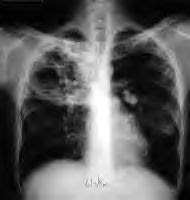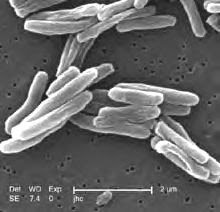A vaccine meant to protect against tuberculosis is jeopardising the lives of HIV-infected infants, warn experts in a major new report. They call for improvements to vaccination programmes to avoid increasing the health risks for children whose immune systems are weakened by HIV.
The report focuses on how the “global epidemics of HIV and tuberculosis has exploded to create a deadly co-epidemic”, that is rapidly spreading in sub-Saharan Africa. It warns that about a third of the world’s 40 million people with HIV/AIDS are co-infected with TB, and that the mortality rate these people is five times higher than that for tuberculosis alone.
It also notes that the use of the Bacille Calmette-Guérin (BCG) vaccine against TB in babies with HIV may actually be making the situation worse.
Veronica Miller, a co-author of the report and director of the Washington, DC-based Forum for Collaborative HIV Research, said that there is an "urgent" need for changes to vaccination programmes in sub-Saharan Africa, including improved testing to know whether infants have HIV before vaccinating them against TB.
Live strain
The growing threat of TB and the drug-resistant forms of this bacterial infection that commonly attacks the lungs has increased the need for widespread vaccination, experts say.
Unfortunately, there is a lack of new vaccines against TB, which kills nearly 2 million people each year. For this reason, doctors must rely on the BCG vaccine, developed almost a century ago from a usually non-pathogenic, live strain of Mycobacterium bovis – the cow form of the bacterium that causes TB.
Physicians routinely administer this vaccine to newborns in regions where TB has re-emerged as a threat. This means that millions of infants in developing nations in Africa and Asia receive the vaccine in their first few hours of life.
Unfortunately, though, many of these infants are born with HIV, and subsequently have a weakened immune system. This weakened condition makes them vulnerable to “BCG disease”, a serious illness caused by the M. bovis of the BCG vaccine, which would otherwise not pose a threat.
BCG disease
One recent study conducted in South Africa and published in the journal Clinical Infectious Diseases found that six out of the eight children that became severely ill from the BCG vaccine ultimately died from the M. bovis infection (vol 15, p 559-61). The majority of these children were found to have had HIV.
Miller says that an estimated 600,000 children are born with HIV each year and hundreds are at risk of dying as a consequence of BCG vaccination.
The World Health Organization (WHO) had previously recommended that the BCG vaccine be given to all healthy infants as soon as possible after birth. However, the WHO revised its position and stated in a May 2007 report that "recent evidence shows that children who were HIV-infected when vaccinated with BCG at birth, and who later developed AIDS, were at increased risk of developing BCG disease."
The report adds that, "among these children, the benefits of potentially preventing severe TB are outweighed by the risks associated with the use of BCG vaccine."
Sophisticated tests
The challenge is to develop more sophisticated HIV tests for newborns, says Miller, who also conducts research at George Washington University in Washington, DC, US. But this will take a bigger financial commitment from governments and aid organisations, she adds.
She explains that the types of HIV tests commonly used in the developing world cannot distinguish the HIV status of infants until they reach about six months of age.
The search for more effective tuberculosis vaccines could produce novel options that avoid the problem of BCG-related illness, says Lewellys Barker at the Aeras Global TB Vaccine Foundation in Rockville, Maryland, US.
He notes that scientists are designing TB vaccines that involve the injection of proteins, as opposed to live bacteria, which would not pose as great a threat to children with HIV.
Journal reference: HIV-TB Co-Infection: Meeting the Challenge (pdf)
WHAT'S NEW IN TUBERCULOSIS
Saturday, 8 December 2007
Subscribe to:
Post Comments (Atom)





No comments:
Post a Comment